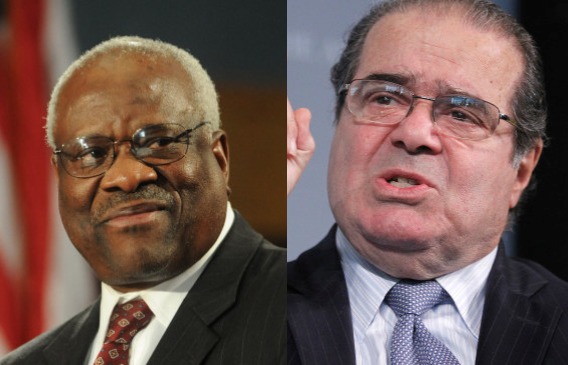In the Supreme Court, free speech is often a partisan issue.
Justices — liberal and conservative — are more likely to vote for free-speech rights when the speaker shares their ideology, according to an eye-opening new study by the University of Southern California which looks at 4,519 votes from 1953 to 2011 and concludes that “justices are opportunistic free speechers.”
The most opportunistic member over that span was found to be Justice Antonin Scalia, who was just over three times as supportive of free-speech rights of conservatives as compared to liberals.
Not far behind him was Justice Clarence Thomas, who was just under three times as likely to back conservatives’ free-speech rights over liberals.
Justices Anthony Kennedy and Sandra Day O’Connor — both Reagan appointees, and often swing votes — were also found to have a statistically significant preference for free speech rights of conservatives over liberals.
The disparity exists with liberal members, too. Justice John Paul Stevens, who retired in 2010, was likelier to support the free speech claim by a liberal as compared to a conservative. Clinton appointees Ruth Bader Ginsburg and Stephen Breyer were not found to have a statistically significant preference in their cases.
“[Justices’] votes are neither reflexively pro- or anti-the First Amendment but rather pro- or anti- the speaker’s ideological enclave,” the researchers say.
The USC study measured the percentage of support for free speech claims by justices. The results for Bush appointees Samuel Alito and John Roberts could not be fully modeled, given their fewer votes, but early data suggest they follow a highly opportunistic pattern, too. Obama appointees Elena Kagan and Sonia Sotomayor were excluded from the study because they have not yet cast enough First Amendment votes in their time on the court.
Below is a table from a summary of the findings as prepared for the New York Times, which first reported on the study Monday. The paper, by Lee Epstein, Christopher M. Parker and Jeffrey A. Segal, is titled, “Do Justices Defend the Speech They Hate? In-Group Bias, Opportunism, and the First Amendment.”

Photo credit: AP; split by TPM’s Brendan James







Clarence Thomas never speaks; However he supports whatever Scalia has to say.
“Some people are more equal than others” - 1960’s conservatives
“Some speech is more free than other speech” - 2014 conservatives
Doesn’t sound like it is really “liberal and conservative” who are more likely to vote with their ideology. Sounds like mostly conservatives do that more often. Big shock.
Really, Sahil? That’s your takeaway - that both sides do it?
One liberal justice shows a “statistically significant” difference, versus six(!) conservative justices, and that liberal’s difference is radically smaller than that of his conservative counterparts.
Really, Sahil? The take-away from that graph is that the arch-conservative justices (Roberts, Scalia, Thomas, Alito) are overwhelmingly more likely to favor conservative speech than liberal speech; for the liberal justices (Ginsburg, Souter, Breyer, Stevens) the trend is slight to non-existent.